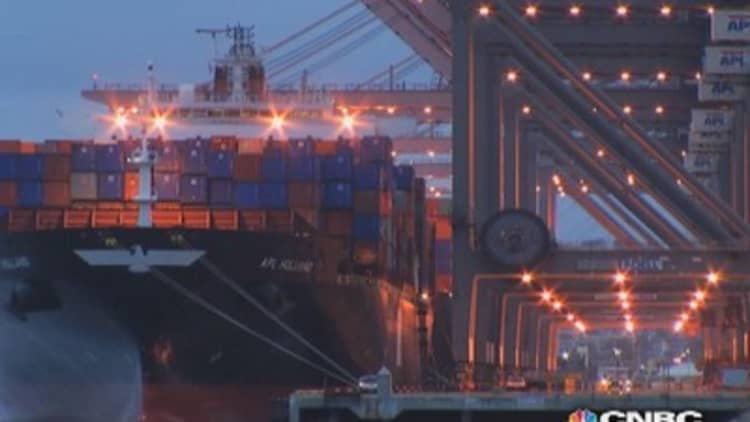There are 620 cycling trainers stuck in Long Beach, California.
They spent close to five days stuck on a boat outside of the port. When the container they were in was finally unloaded off the ship, it was parked in a rail transfer yard for two days. At this publication time, they are still there.
The cycles were supposed to be in Atlanta on Wednesday. Given the delay there was no way the equipment, already pre-sold to customers, would make it to their destinations by Christmas.
So the importer, Wahoo Fitness, loaded another 620 of its training cycles, called KICKRs and retailing for about $1,100 each, onto an airplane and flew them over from Asia. It cost $68,000. The ocean freight bill is typically between $3,000-$5,000.
"It will reduce our gross margin by a third to a half," said Mike Stashak, vice president of sales and marketing at Wahoo, in an interview. "We're still making money off it, but not a whole lot."
This is just one illustration of how ongoing problems at West Coast ports are hurting American businesses during the critical shopping season.
"For investors the 'watch out' is smaller retailers with less supply chain sophistication who won't have hedged the west coast with shipments through New York/New Jersey, Savannah, or New Orleans," emailed Kevin O'Marah, head of research for SCM World, a supply chain professional organization. "Merchandise on boats or in the yard, but not yet in truck chassis may well mean out of stocks and missed sales. The other big danger is big U.S. agricultural businesses like IBP or Cargill. Meat, produce and bulk agricultural commodities can't get out to Asian and Latin American markets and will, in some cases, spoil and be lost completely."

Indeed, some retailers have already blamed congestion at West Coast ports, which handle more than half of imports from Asia, for problems in their earnings performance.
Problems at the ports have been growing throughout the fall shipping season as talks between the dockworkers' labor union and port employers have dragged on. The union has been without a contract since July.
"We are still far apart on a number of issues and the disruptions continue to grow," said Wade Gates, a spokesman for the Pacific Maritime Association, which represents ship lines and terminal operators that employ the longshoremen. Among its 72 members are publicly-traded Matson Navigation Co. and Maersk Inc.
Management has accused the workers, represented by the International Longshoremen's and Warehousemen's Union, of staging slowdowns and purposely holding up cargo. The union has blamed traffic mismanagement and equipment shortages for the congestion.
Read MoreWhat's behind the West Coast traffic jam...
"Our members continue to be concerned about the ongoing congestion and slowdowns at the ports," said Jon Gold, who oversees transportation issues for the National Retail Federation. "They continue to encounter delays in getting their cargo from the different ports. This continues to impact last minute holiday merchandise which has been stuck as well as early Spring shipments."
Retailers and manufacturers have been urging the two sides to turn to federal mediation. But so far the negotiators seem unwilling to do so. And, since the holiday shipping season has passed, there's been growing speculation that management may resort to a lockout since the customer backlash would be relatively minimal. Management staged a lockout in 2002. Those 10 days cost the economy upwards of $1 billion a day by some estimates. The White House had to order the ports reopened.
If there is a West Coast port shutdown, it's likely that smaller businesses without the global logistics wherewithal will take it on the chin. Again.
"Okay we're a small fish in a big pond," said Wahoo's Stashak. "And I want everyone to get their fair due. But this just shows how these things trickle down and really hurt the smaller guys that really aren't involved in it."
By the way, Wahoo's next shipments? They are going through Savannah.


